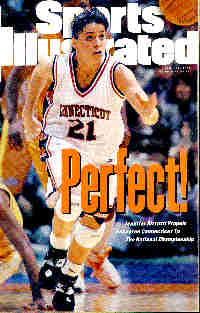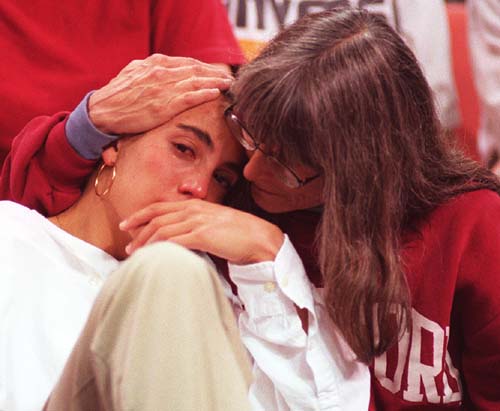
|

|

|

|

|
You Need a Hoop! If You Don't Have Goals, You Probably Won't Play |
Immeditely, the home team took possession of the ball. The star guard dribbled cautiously down court and saw one of his teammates standing in the open, beneath the backboard. A quick pass, and the shot was up, arching perfectly toward the ... but it fell to the floor. There was no hoop on the backboard!! Everyone was confused, then frustrated, but there was none. After a few minutes of chaos, the game was cancelled, because without hoops the officials could not keep score, the players would not know if they hit or missed, and the fans would never know how well thier teams played.
And that's the answer. Life without goals is like a basketball game without hoops. You not only can't keep score, but you probably won't even play the game. Accomplishment requires goals.. Your goals determine your thoughts. Your thoughts determine your life -- what you are and what you have. You have become what you spend most of your time thinking about up until now. If you are not happy with what you are or what you now have, then you can still change, by changing your thinking.
The great scientist Sir Isaac Newton was asked how he discovered the law of gravity. "By thinking about it all the time," he answered. So set your hoops (your goals) and think about them all the time. You WILL get what you want.
Here's what you can do: Each month set your "hoops" -- 3 realistic, 30-day goals --- one for you, one for your family, and one for your career. Be sure they are practical and attainable as well as meaningful to you. Write them on a piece of paper or on the back of an index card, and carry them with you everywhere. Look at them several times a day. After achieving them, as you will, set new "hoops". And as you play the game of life, take aim and shoot for your hoop!
|
A Stumbling Block or a Stepping Stone?
Isn't it strange that princes and kings,
To each is given a book of rules
|
Hoop Dreams and Girls
 "If you let me play," says another, "I'll be less likely to get pregnant before I'm ready. I will be
less likely to stay with a man who beats me." Still another girl adds, "I will know what it means
to be strong, if you let me play." The product being sold isn't even mentioned, but depression,
teen pregnancy, and cancer are. What kind of commercial is this anyway?"
"If you let me play," says another, "I'll be less likely to get pregnant before I'm ready. I will be
less likely to stay with a man who beats me." Still another girl adds, "I will know what it means
to be strong, if you let me play." The product being sold isn't even mentioned, but depression,
teen pregnancy, and cancer are. What kind of commercial is this anyway?"
It's called "If You Let Me Play," and -- in just 30 seconds -- it delivers a powerful message about the benefits gained by girls who play sports. But is the message true? Can sports really make that big a difference in a girl's life? Or is Nike, the shoe manufacturer that sponsors the commercial, creating some hoop-dream hoopla in order to sell more sneakers to girls?
Statistics and Studies To find out, Read called the Nike Corporation and asked about the information in "If You Let Me Play." In response, Nike sent us a long list of references, including studies completed by researchers for the National Cancer Institute, the National Institutes of Health and the Ms. Foundation.
The link between physical activity and a reduced cancer risk was easy to make. As little as four hours of exercise a week, the National Cancer Institute found, can reduce the risk of breast cancer in women by almost 60 percent. That cause-and-effect relationship is strongly supported by years of research.
Another study, conducted by Mary Ellen Colton and a colleague from the University of Massachusetts, found that half of all girls who participate in some kind of sport have higher-than-average levels of self-esteem and suffer less depression. In other words, playing sports appears to give girls more confidence physically and emotionally -- the kind of confidence that enables them to say no to drugs and walk out of abusive relationships.
The lines of dialogue recited by the girls on the playground came right out of the studies cited by Nike. But what the research didn't show is why playing a sport makes such a difference. Is it the pressure of competition? Is it the physical exercise? Is it learning how to be a team player? Or is it something much more simple, like giving kids an interest and keeping them off the streets? "We just don't know," says researcher Colton.
To try to find the answer that even the researchers are still hunting down, Read looked beyond the statistics. We looked beyond the TV images of the girls on the playground. We looked on the basketball court and found two remarkable young women who play.
 Rizzotti's Dream If you let me play, I will be an All-American.
When Jennifer Rizzotti was growing up in New Fairfield, CT, she loved playing soccer and thought that
kicking a ball on a green field would be her lifetime passion. Wrong. Both her father and brother were
basketball players, and when Jen was in fifth grade, they took her onto a court and turned her loose. She
was a natural. Almost overnight, dribbling and shooting a ball on a hardwood floor became her new
obsession. The rest is history, or rather women's basketball history. Last season, Rizzotti led the
University of Connecticut Huskies to the national championship. Along the way, Sports Illustrated
featured her on its cover with this headline: Perfect. The New York Times ran a series of
articles following her on and off the court. And last fall, the Associated Press named her to its
All-America first team. In fact, Rizzotti received the most votes of any player from the media panel of
sportswriters.
Rizzotti's Dream If you let me play, I will be an All-American.
When Jennifer Rizzotti was growing up in New Fairfield, CT, she loved playing soccer and thought that
kicking a ball on a green field would be her lifetime passion. Wrong. Both her father and brother were
basketball players, and when Jen was in fifth grade, they took her onto a court and turned her loose. She
was a natural. Almost overnight, dribbling and shooting a ball on a hardwood floor became her new
obsession. The rest is history, or rather women's basketball history. Last season, Rizzotti led the
University of Connecticut Huskies to the national championship. Along the way, Sports Illustrated
featured her on its cover with this headline: Perfect. The New York Times ran a series of
articles following her on and off the court. And last fall, the Associated Press named her to its
All-America first team. In fact, Rizzotti received the most votes of any player from the media panel of
sportswriters.
"Everyone dreams about playing in college, going to the Final Four, and being an All-American," says Rizzotti, "but a lot of times you're not sure if you're capable of achieving the things you dream about." Rizzotti admits that she worked hard to make her hoop dream come true. "I'm a very intense player," she says. "Sometimes I'm too intense. I try too hard. But I have the mentality of wanting to do whatever I can to win, whether scoring or passing or playing defense. I make the right decisions."
But Rizzotti is also quick to credit her success to her teammates. "When you dream about being an All-American and achieve that, it makes you feel like all your hard work was worth it. But you also realize your team is responsible for a lot of that. I've been fortunate to play with great players on teams that win games."
Does Rizzotti sound like a woman with high self-esteem and confidence, someone who knows what it means to be strong?
Weddle's Dream If you let me play, I will be the first woman in the NBA. Nikki Weddle didn't wait for someone to ask her to play. When she couldn't find enough girls to make a team, she picked up the ball and played anyway -- against the boys. But taking on the boys wasn't easy. In middle school, Weddle took a lot of criticism -- not so much from the guys but from the girls, who called her some pretty raunchy names for daring to be different from them.
"The African American female is supposed to be pretty and wear dresses," says Weddle. "She is not supposed to shoot hoops. It's not cool. In the black community, basketball is still a man's sport." Although Weddle is now a junior in high school in Denver, CO, the game still has roadblocks for her, a black female from a poor section of the city. "For a black guy, basketball has always been considered as a way out of the projects or the ghetto," she explains. "Grow up and get rich in the NBA. That dream's not there for the female. Her only proper dream is to be a lawyer, a nurse, or a doctor -- but never a professional basketball player."
But Weddle never did wait for someone to ask her to play or to keep playing. With the encouragement of her dad, a basketball referee, and with the same intensity as All-American Jennifer Rizzotti, Weddle has launched herself to the top. She is the top-rated prep guard in Colorado. She realizes she may never be the star of a national commercial like Shaquille O'Neal, but that doesn't stop her from dreaming. Each morning she wakes up vowing to be the first woman in the NBA. Who knows? With her kind of confidence and positive self-image, she just may make it.
Hoop dreams -- young women like Jennifer Rizzotti and Nikki Weddle have them too. And sure, the 30-second commercial may be about selling sneakers. But a spokesperson for Nike points out, it is also "a call to action for everyone -- parents, educators, and citizens at large to understand that girls' sports are important and should be supported."
A team that is ready to play will usually: |

In 1626, Indians sold what is now called Manhattan Island, New York. White settlers purchased it for a pile of trinkets worth only $24. Manhattan's value as real estate is now appraised at $23.4 billion. But if the Indians had sold those trinkets for $24 cash and placed the money in a six percent compound-interest account, their investment would now total $27.6 billion. And if today's Indians had inherited this fortune, they could buy back Manhattan and still have over $4 billion left in their account.
That isn't to say the Indians got a fair deal, but rather to illustrate that what seems like a little bit might be a lot more than you thought. In other words, great accomplishments don't necessarily require a huge initial investment, the talent of a genius, an incredible windfall, or a Herculean effort. Great accomplishments are possible for anyone who can must just a little bit and then keep at it with persistence.
Consider another example: just as $24 isn't much principal, and six percent isn't an attractive interest rate by today's standards, a highway built at a seven percent grade isn't what anyone would call steep. If you stood at one end of a straight, three-mile stretch of this highway, you might swear it was level! But it's not. And there is such a highway. It begins at sea level in California, and without ever exceeding a seven percent grade, it eventually reaches 12,095-foot Independence Pass in Colorado, at which point it acquires the distinction of being the highest paved road in the United States. It's so high that trees don't grow there. Only arctic tundra can survive the brutal climate. Hurricane-force winds sometimes slam across the pass, and snow is possible any day of the year. Even during a middling gale, the chill factor can easily plunge to minus 95 degrees in January. Yet you can drive there during summer, enjoy a 360-degree view of the magnificent Rocky Mountains; and all the way from the warm, sunny coastline, you won't have climbed more than just a little bit.
So, whether you want to get rich or go far, lose weight or learn a new skill, win an award or write a book, don't handicap yourself by imagining that your goal is beyond your reach. Start with just a little bit, and be persistent. You'll probably accomplish a lot more than you thought possible. You can climb your "mountains" by making steady, safe and gradual progress.


First, after you lose you should think. Thinking should keep you from laughing and probably from crying as well. Neither laughing nor crying is likely to help you much for next time. But thinking is always valuable. Did you give your best physical effort? Were you fully tuned into the game mentally? What things could YOU have done better? How could YOU have prevented the loss? What would you do differently if you had it to do over? What did the other team do to confuse you or to make it difficult? Can you use that on someone else in the next game?
There are a lot of questions to ask yourself, and those should come in place of the more common comments like, "The referees were terrible," "The coach was stupid," or, "If only Jones hadn't tried that stupid shot."
 No one loses a game singlehandedly. There are unfortunate circumstances when a player misses a shot at the
end with his team a point behind, or he travels with the ball or kicks it out of bounds. People may say HE lost it.
But he didn't. YOU lost it, with that one turnover at the beginning, that bad pass, or that failure to talk on defense
in the first half that gave the other team an easy basket.
No one loses a game singlehandedly. There are unfortunate circumstances when a player misses a shot at the
end with his team a point behind, or he travels with the ball or kicks it out of bounds. People may say HE lost it.
But he didn't. YOU lost it, with that one turnover at the beginning, that bad pass, or that failure to talk on defense
in the first half that gave the other team an easy basket.
Get out of the habit of blaming the referees and coaches and others, and THINK. Don't decide until the next day what your verdict is. A lot of times, with emotions high after a big game, things get said that aren't meant and aren't true. But, mixed in with disappointment, anger and fatigue, it is easy to say things that won't seem so intelligent the next morning.
Get in the habit of saying that you aren't sure what happened or why you lost. Say you need time to think about the game. And then do that. Think about it. Go back over every play, everything you can remember -- not forever, not even for a week, but certainly on your way off the court, in the locker room, on the bus home, and that night in bed. That ought to be enough.
There should be some jokes in the morning that will be funny again, and it will be time to be getting ready to win the next one, to encourage others, and to go on living. It's only after the game you should think about it. Think so much that there isn't time to laugh or cry. If you don't think about it when it is fresh in your mind, it is difficult to believe that you really want to be a good player. Good players think. Especially after a loss. That's how they learn not to lose very often.

|
 | Return to Basketball Page |
| Return to Basketball Page |